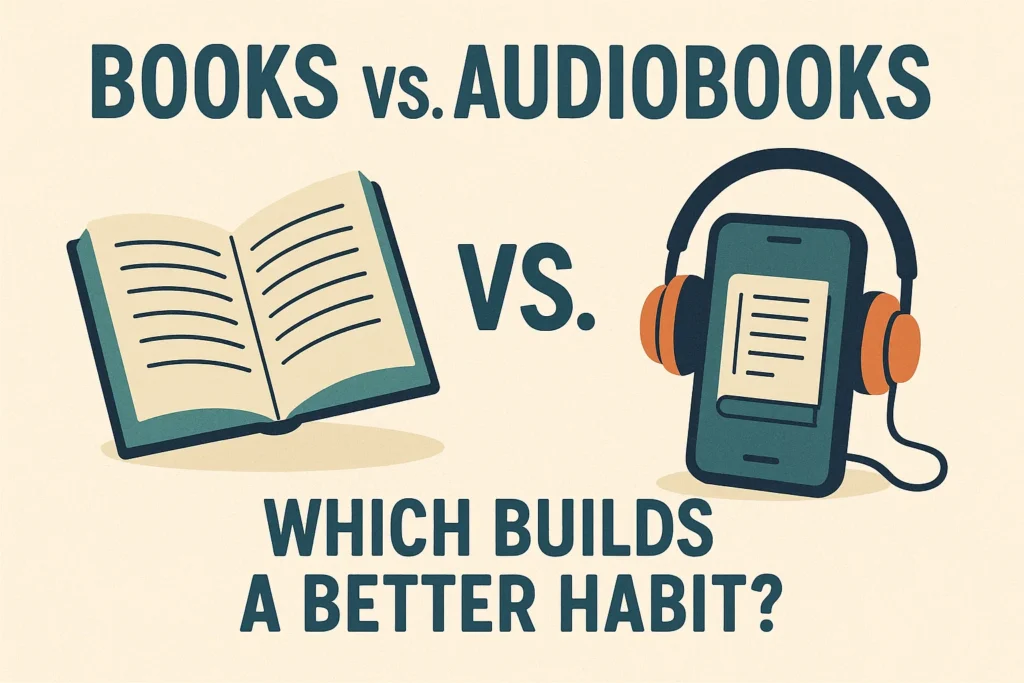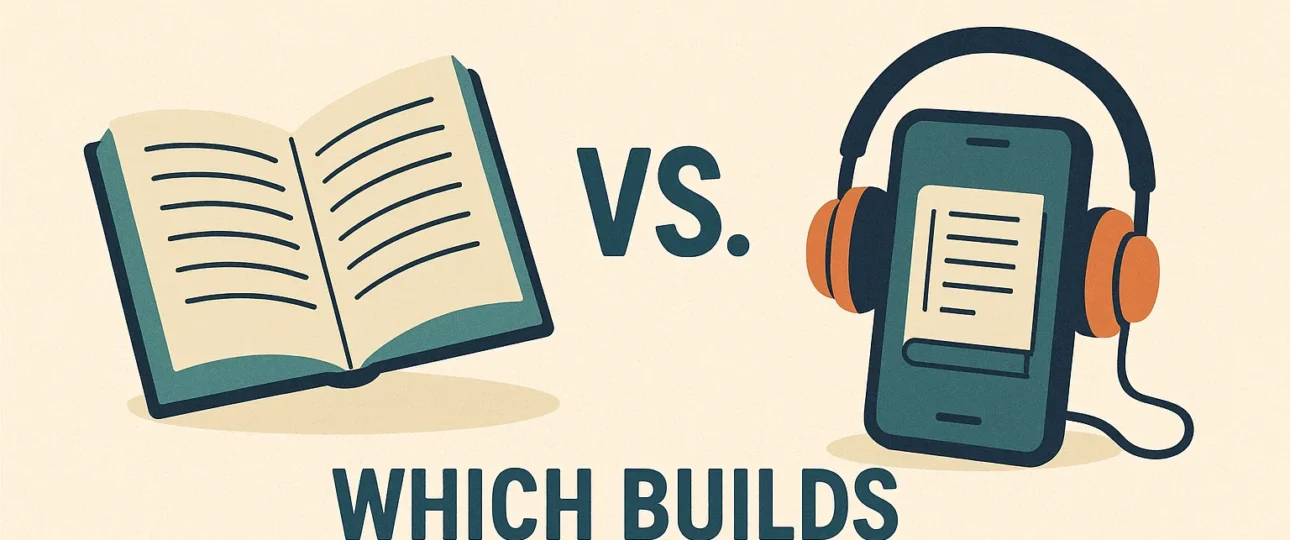Books vs. audiobooks: which builds a better habit? As technology continues to reshape the way we consume information, this question is gaining traction among readers and lifelong learners. Both traditional reading and audiobook listening offer distinct advantages, but when it comes to habit-building, the answer is more nuanced than simply picking a format.
In this article, we’ll dive into the pros and cons of both books and audiobooks, examine psychological and behavioral studies, and ultimately help you determine which format is better suited for building a long-lasting reading habit.
📚 The Power of Reading Books
Traditional books have long been a staple in education, personal growth, and storytelling. For many, holding a physical book offers a tactile experience that engages more senses, creating a deeper connection to the content.
Benefits of reading books:
- Improved Focus and Attention Span
Reading a physical book requires undivided attention. Unlike multitasking with an audiobook while driving or cleaning, reading demands visual concentration, helping build stronger focus over time. - Enhanced Comprehension and Retention
Research suggests that people often comprehend and retain information better when reading printed text compared to listening. This is partly due to the active engagement required in reading, such as highlighting, underlining, or note-taking. - Cognitive Engagement
Reading stimulates different parts of the brain involved in visual processing, imagination, and memory. It’s a mental workout that fosters critical thinking and deep processing of information. - Digital Detox
Physical books offer a break from screen time, which can reduce eye strain and help improve sleep quality, especially when read before bed.
Drawbacks of traditional reading:
- Time-consuming: Reading requires dedicated, uninterrupted time.
- Accessibility: People with visual impairments or learning differences may find reading challenging.
- Portability: Carrying multiple physical books can be inconvenient while traveling.

🎧 The Rise of Audiobooks
Audiobooks have exploded in popularity thanks to platforms like Audible, Spotify, and Google Play Books. Their hands-free nature makes them appealing to busy professionals, commuters, and multitaskers.
Benefits of audiobooks:
- Convenience and Flexibility
You can listen to audiobooks while driving, exercising, or cooking. This allows users to consume content during “dead time,” increasing their overall reading volume. - Accessibility
Audiobooks are a blessing for people with dyslexia, visual impairments, or attention disorders. Listening provides an alternative route to information that can be more engaging and less stressful. - Enhanced Emotional Connection
Many audiobooks are narrated by professional voice actors—or even the authors themselves—which adds emotional depth, pacing, and nuance to the story. - Faster Consumption
Most platforms allow users to increase playback speed, making it possible to consume content faster than traditional reading.
Drawbacks of audiobooks:
- Lower Retention: Studies suggest that listeners may retain less information than readers, especially when multitasking.
- Distractions: Listening can be more passive, and it’s easier to tune out or miss key details.
- No Visual Interaction: There’s no way to annotate or skim back easily as with a printed page.
🔍 Books vs. Audiobooks: Which Builds a Better Habit?
Now let’s return to the core question: books vs. audiobooks— which builds a better habit? Habit formation is influenced by several psychological principles including consistency, motivation, and reward systems. Let’s explore how each format measures up.
- Consistency
Audiobooks win when it comes to consistency for busy individuals. You can listen daily without setting aside exclusive time for reading. That said, people who schedule dedicated “reading time” with books often build stronger, more intentional habits. - Motivation
Readers motivated by learning, focus, and comprehension may find traditional books more satisfying. In contrast, audiobooks can be more motivating for people with time constraints or those who prefer auditory learning. - Reward and Satisfaction
Finishing a physical book can feel like a tangible accomplishment, whereas audiobooks provide more frequent opportunities for short bursts of progress, which can be rewarding in small doses. - Habit Tracking
Physical books are easier to track in terms of progress. You can see how much you’ve read and set measurable goals (e.g., pages per day). Audiobook apps offer tracking tools too, but some users find them less satisfying. - Integration with Lifestyle
Audiobooks easily integrate with a fast-paced lifestyle. They are ideal for those who struggle to sit still or focus visually. On the other hand, book lovers often create a calming ritual around reading—sipping tea, curling up in bed—which enhances the habit-forming experience.
🧠 Scientific Insights on Reading vs. Listening
Cognitive research has shown that reading and listening activate similar parts of the brain, especially the language processing centers. However, subtle differences exist:
- Reading tends to activate more areas related to visual imagination and working memory.
- Listening engages auditory processing and can foster emotional connection, particularly in narrative fiction.
In a 2019 study published in the journal Reading and Writing, researchers found that comprehension was slightly higher when students read material compared to when they listened, though the differences were marginal.
💡 Tips for Building a Stronger Habit with Either Format
Whether you prefer books or audiobooks, here are actionable strategies to make your habit stick:
- Set a Daily Goal
Whether it’s 20 pages or 20 minutes, daily targets help anchor your routine. - Create a Cue
Attach your reading or listening habit to an existing activity (e.g., reading before bed or listening during your commute). - Track Your Progress
Use apps like Goodreads or Audible’s built-in stats to monitor streaks and completed books. - Eliminate Distractions
Silence notifications, use noise-canceling headphones, or read in a quiet space to enhance focus. - Mix Formats
Try hybrid reading—listen to an audiobook during the day and read the same content at night to reinforce understanding and habit.
📊 Comparative Table: Books vs. Audiobooks in Habit Formation
| Criteria | Physical Books | Audiobooks |
|---|---|---|
| Focus & Attention | High | Medium |
| Convenience | Low | High |
| Retention & Comprehension | High | Medium |
| Accessibility | Medium | High |
| Motivation for Busy Users | Low | High |
| Sensory Engagement | High (Visual & Tactile) | High (Auditory & Emotional) |
| Habit-building Potential | Strong (if scheduled) | Strong (if consistent) |
🎯 Final Verdict: Books vs. Audiobooks—Which Builds a Better Habit?
So, books vs. audiobooks—which builds a better habit? The answer depends largely on your lifestyle, learning preferences, and goals.
- If your priority is deep focus, retention, and mindfulness, traditional books are likely to help you build a stronger habit.
- If your schedule is hectic and you thrive on multitasking, audiobooks may offer a more realistic and consistent path to habit formation.
Ultimately, the best habit is the one you can maintain consistently. There’s no one-size-fits-all answer. Many successful readers incorporate both formats into their lives, enjoying the unique benefits of each.
Whether your hands are turning pages or pressing play, what matters most is that you’re making time to learn, grow, and connect with new ideas every day.
🔁 Final Tip: Don’t be afraid to experiment. Track how many books or hours you complete with each format over a month. Then ask yourself: which helped you build a sustainable, enjoyable reading habit?
Read More Benefits of Using Educational Ebooks


1 Comment
[…] Read More Books vs. Audiobooks Which Builds a Better Habit […]